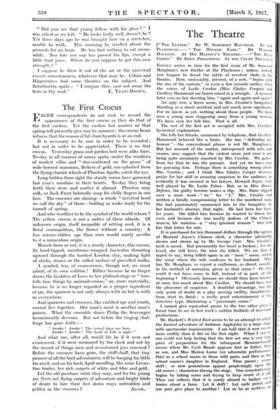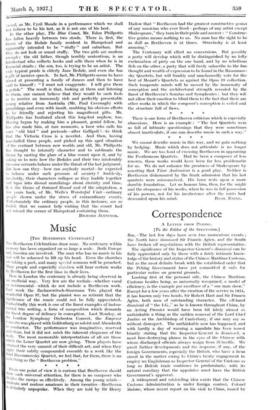The Theatre
[" THE LETTER." BY W. SOMERSET MAUGHAM. AT TIM PLAYHOUSE.-" THE WICKED EARL." BY WALTER HACKETT. AT HIS MAJESTY'S THEATRE.-" THE BLUR COMET." BY EDEN PHILLPOTTS. AT THE COURT THEATRE]
KINDLY arrive in time for the first scene of Mr. Somerset Maugham's new thriller at the Playhouse ; unless, indeed,
you happen to dread the rattle of revolver shots in the theatre. Here, undeniably, interest, of a sort, " begins with the rise of the curtain," or even a few seconds earlier, when the voices of Leslie Crosbie (Miss Gladys Cooper) and Geoffrey Hammond are heard raised in a wrangle. A moment later you see her shooting him, " again and again and again."
An ugly row, a fierce scene, in Mrs. Crosbie's bungalow I Startling as a street accident and not much more significant. For we know, as yet, nothing about these people. We have seen a young man staggering away from a young woman. We have seen her kill him. That is all.
The rest of the first act is occupied with Mrs. Crosbie's hysterical explanation.
She tells her friends, summoned by telephone, that Geoffrey Hammond behaved like a brute. She was " defending her honour "—the conventional phrase is not Mr. Maugham's. But her account of the matter, interspersed with sobs and moans, may suggest that the violent scene just over is not being quite accurately reported by Mrs. Crosbie. We gather from her that he was the pursuer. And yet we have seen her pursuing him. Perhaps there is something wrong about Mrs. Crosbie ; and I think Miss Gladys Cooper deserves praise for her skill in arousing suspicion in the audience, as evidently it was aroused in her lawyer, Howard Joyce, very well played by Mr. Leslie Faber. But, as in Mrs. Done's Defence, the guilty heroine makes a slip. Mrs. Dane slipped over a mere word—" we " for " I." Mrs. Crosbie had written a fatally compromising letter to the murdered man. She had passionately summoned him to the bungalow, in her husband's absence, that night. He had been her lover for years. She killed him because he wanted to throw her over, and because she was madly jealous of the Chinese woman, his mistress—a " very ignorant woman " who now has that letter for sale.
It is purchased for ten thousand dollars through the agency of Howard Joyce's Chinese clerk, a character admirably shown and shown up by Mr. George Carr. Mrs. Crosbie's neck is saved. But presumably her heart is broken ; for she loved, she still loves, the man she killed. We see him, I regret to say, being killed again in an " inset" scene, within the scene where the wife confesses to her husband. Why has Mr. Maugham, so expert a craftsman, so direct, usually, in his method of narration, given us that scene ? Or why could it not have come in full, instead of in part, at the beginning ? Obviously because we should then have known, at once, too much about Mrs. Crosbie. We should have lost the pleasures of suspicion. A doubtful advantage, but the only point of doubt in a play moving swiftly, breathlessly. from start to finish : a really good entertainment of the detective type, illustrating a " passionate crime."
I cannot give equivalent praise to the two other plays found time to see in last week's sudden fusillade of incessant productions.
Mr. Hackett's Wicked Earl seems to be an attempt to adapt the farcical adventure of Ambrose Applejohn to a large stage with spectacular requirements. I am told that it now moves more swiftly than it did on the first night. When I saw it one could not help feeling that the first act was a very long piece of preparation for the subsequent Mexican-bandit scenes where Mr. Cyril Maude appears first as father, then as son, and Miss Marion Lorne (an admirable performance, this) as a school marm in those wild parts, and then as the school marm's daughter in England. Time passes ; scenes shift ; or new generations appear perplexingly upon the old scenes ; characters throng the stage. One conscientiously begins by taking notes and trying to keep count of it 511. Then one reflects that it is surely absurd to badger one. brains about a farce. Let it drift ! Let earls perish and one peer give place to another ! Let us be as reckless, as ?asual, as Mr. Cyril Maude in a performance which we shall not believe to be his last, as it is not one of his best. In the other play, The Blue Comet, Mr. Eden Phillpotts has fallen heavily between two stools. There is, first, the theme of the Bedale family resident in Hampstead and apparently intended to be " stuffy " and suburban. But they do not look or sound stuffy. The two girls are modern enough ; the old father, though terribly sententious, is an intellectual who collects books and sells them when he is in financial straits ; the son, too, is trying to be an artist. The only typical prude is elderly Jane Bedale, and even she has B gift of incisive speech. In fact, Mr. Phillpotts seems to have aimed at presenting a family of dunces and then to have said to himself : " I must not exaggerate. I will give them a polish." The result is that, looking at them and listening to them, one cannot believe that they would be such fools as to receive an immensely rich and perfectly presentable voting relative, from Australia (Mr. Paul Cavanagh) with ;;rumblings and even with insult, snubbing his obvious efforts to be friendly and rejecting his magnificent gifts. Mr. Phillpotts has hesitated about this long-lost nephew, too. Having begun by making him a pleasant, genial fellow, he has also made him, at rare moments, a boor who calls his aunt " old bird " and pretends—after Gallipoli !—to think that the Victoria Cross is a novelist. And then, having marshalled these people, and picked up this aged situation of the contrast between new worlds and old, Mr. Phillpotts has thought to intensify character and to sublimate the theme by casting the glare of a blue comet upon it, and by asking us to note how the Bedales and their two intolerably tiresome servants behave under the threat of the last judgment. But how can they—how can anybody mortal—be 'expected to behave under such pressure of anxiety ? Suddenly, inevitably, their characters collapse as they huddle together Ind lapse into dismal moralizings about eternity and time, It is the theme of Outward Bound and of the adaptation, a few years back, of Mr. Wells's Wonderful Visit—ordinary people shown under the stress of extraordinary events. Unfortunately the ordinary people, in this instance, are so foolish that we cannot help' wishing that the comet had not missed the corner of Hainpstead containing them.
RICHARD JENNINGS.































































 Previous page
Previous page